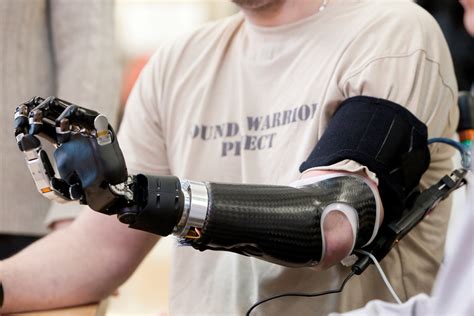The field of bio tech prosthetics has undergone significant advancements in recent years, transforming the lives of individuals with amputations or limb differences. These innovative prosthetic devices not only restore physical function but also improve overall quality of life. In this article, we will explore five ways bio tech prosthetics enhance human lives, highlighting the benefits, working mechanisms, and future prospects of these remarkable technologies.
Restoring Mobility and Independence

Bio tech prosthetics play a crucial role in restoring mobility and independence for individuals with amputations. Advanced prosthetic limbs, such as mind-controlled prosthetics, enable users to perform daily activities with greater ease and confidence. These devices are designed to mimic the natural movement and function of human limbs, allowing users to walk, run, and engage in various physical activities without significant restrictions.
Mind-Controlled Prosthetics: A Breakthrough in Mobility
Mind-controlled prosthetics are a remarkable example of bio tech innovation. These devices use electroencephalography (EEG) or electromyography (EMG) sensors to detect brain signals or muscle activity, allowing users to control their prosthetic limbs with mere thoughts or muscle contractions. This technology has revolutionized the field of prosthetics, providing individuals with unprecedented control and mobility.
Enhancing Sensory Perception and Feedback

Bio tech prosthetics also focus on enhancing sensory perception and feedback, allowing users to better interact with their environment. Advanced prosthetic devices, such as those with sensory feedback systems, enable users to feel tactile sensations, temperature, and pressure. This technology has significant implications for individuals with amputations, as it enhances their ability to perform daily tasks and interact with their surroundings.
Sensory Feedback Systems: A New Era in Prosthetic Technology
Sensory feedback systems are a critical component of modern bio tech prosthetics. These systems use sensors and electrodes to transmit sensory information from the prosthetic device to the user's nervous system. This technology has been shown to improve prosthetic control, reduce phantom limb pain, and enhance overall user satisfaction.
Improving Mental Health and Well-being

Bio tech prosthetics have a profound impact on mental health and well-being, particularly for individuals with amputations. The use of advanced prosthetic devices can reduce stress, anxiety, and depression, while improving overall quality of life. This is largely due to the restored sense of independence, mobility, and confidence that these devices provide.
The Psychological Benefits of Bio Tech Prosthetics
The psychological benefits of bio tech prosthetics are multifaceted. These devices enable users to regain control over their lives, participate in activities they previously enjoyed, and reconnect with their communities. By addressing the physical and emotional needs of individuals with amputations, bio tech prosthetics play a vital role in promoting mental health and well-being.
Advancing Sports and Recreational Activities

Bio tech prosthetics have also revolutionized the world of sports and recreational activities. Advanced prosthetic devices, such as those designed for running, swimming, and cycling, enable individuals with amputations to participate in a wide range of activities. This technology has not only improved physical function but also promoted social inclusion and community engagement.
Prosthetic Devices for Sports and Recreation
Prosthetic devices for sports and recreation are designed to meet the specific needs of athletes and enthusiasts. These devices are often lightweight, durable, and adjustable, allowing users to customize their fit and performance. By providing individuals with amputations the opportunity to engage in sports and recreational activities, bio tech prosthetics promote physical activity, social interaction, and overall well-being.
Future Prospects and Challenges

As bio tech prosthetics continue to evolve, we can expect significant advancements in areas such as mind-controlled prosthetics, sensory feedback systems, and prosthetic devices for sports and recreation. However, there are also challenges to be addressed, including accessibility, affordability, and regulatory frameworks.
Addressing the Challenges of Bio Tech Prosthetics
Addressing the challenges of bio tech prosthetics requires a collaborative effort from researchers, clinicians, policymakers, and industry stakeholders. By working together, we can ensure that these life-changing technologies are accessible to those who need them, while also promoting innovation, safety, and efficacy.






We hope this article has provided you with a comprehensive understanding of the benefits and applications of bio tech prosthetics. These innovative technologies have the potential to transform the lives of individuals with amputations, and we look forward to seeing the impact they will have in the years to come.
If you have any questions or comments about bio tech prosthetics, please feel free to share them below. We would love to hear from you and engage in a discussion about this fascinating topic.
What are bio tech prosthetics?
+Bio tech prosthetics are advanced prosthetic devices that use technology to restore physical function and mobility for individuals with amputations.
How do mind-controlled prosthetics work?
+Mind-controlled prosthetics use EEG or EMG sensors to detect brain signals or muscle activity, allowing users to control their prosthetic limbs with mere thoughts or muscle contractions.
What are the benefits of bio tech prosthetics?
+The benefits of bio tech prosthetics include restored mobility and independence, enhanced sensory perception and feedback, improved mental health and well-being, and advanced sports and recreational activities.
